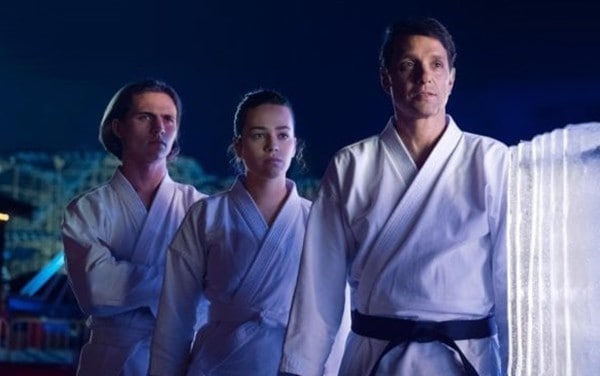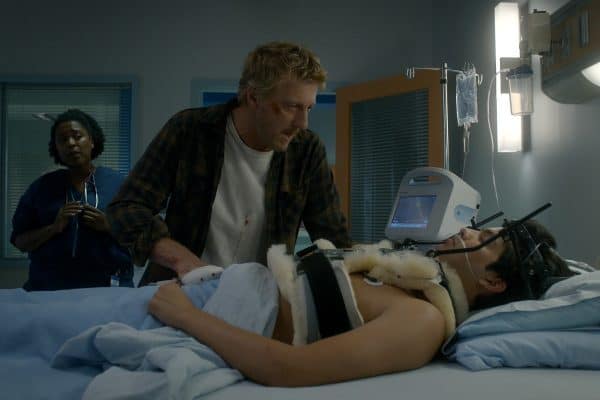Lauren Miles on Cobra Kai and how it makes us love the man-child…
Of all the film franchises that have received the sequel treatment in recent years, The Karate Kid films are perhaps the most unexpected. Despite this, Cobra Kai has picked up a dedicated following thanks to its outrageous drama, dynamic fight scenes and heartfelt moments. While decades have passed since Daniel LaRusso beat Johnny Lawrence at the All-Valley tournament, in terms of their personal development it might as well have been yesterday. Even though the show’s main characters often behave immaturely, one thing that it does extremely well is making them both funny and likeable despite their faults.
Johnny and Daniel can be seen as man-children as both of their lives revolve around their teenage accomplishments, or defeats. This becomes apparent from the very first episode. Daniel’s car dealership relies on its slogan ‘kicking the competition’, and when we first see him he’s karate chopping his way through a commercial on Johnny’s TV. In the real world, Daniel’s business would be what he is known for, but instead we are confronted with a grown adult who is completely defined by a championship that was won 34 years before the start of the show. Similarly, Johnny’s loss to Daniel seemingly set the trajectory for the rest of his life. He is unmarried, estranged from his son, and spends his evenings sat in front of the television drinking beer. Like Daniel, he remains attached to his memories of high school. Even when he sees an opportunity to turn himself around it is by reopening the Cobra Kai dojo, and by doing so reliving his younger years through his students.
Daniel might not be as stuck in the past as Johnny, but when he gets easily caught up in their old rivalry common sense goes completely out the door. Suddenly, the only resolution to Cobra Kai creating a group of school bullies is more karate. According to both Lawrence and LaRusso, the only way to stop violence is with more violence, and this has devastating consequences for the teenagers that become involved. Their personal rivalry is inevitably passed on to their students, creating rifts between friends and leading to the massive Cobra Kai vs. Miyagi Do brawl at the end of the second season. This has legal ramifications for Robby and Tory, and hugely impacts on the physical and mental health of the other characters. Ultimately, it is Daniel and Johnny’s petty squabbling that allows Kreese to influence the Cobra Kai students and thereby create the mess that season three starts to deal with.
On paper, both of them are immature in ways that are incredibly dislikeable. But even with their obvious shortcomings, Cobra Kai makes us love Johnny and Daniel. This is largely because their antics are played for laughs, and this is especially the case with Johnny. Despite his rough-around-the-edges demeanor, he can be incredibly endearing. He is written like an old, grouchy uncle who has no knowledge of technology and is out-of-touch with modern ideals. He doesn’t just want to relive the 1980s – he’s also willingly stuck there in terms of his attitude towards modern technology.
As a result, some of his funniest moments come from his students teaching him to adapt. It’s hard not to laugh at Johnny’s bewilderment at text slang, or Miguel’s exasperation at his essay-length Facebook messages. One of the most commonly used gifs to come out of the show is ‘send it to the internet’. Johnny being inexperienced with technology is another sign of him being stuck in his teenage years, but so much of Cobra Kai’s comedy comes from those moments that it’s hard to care how ridiculous the show’s main character can be.
It is not just their comedic moments that save them from being defined by their immaturity, but the fact that the show mixes its karate and comedy with truly meaningful moments where Daniel and Johnny get to show their vulnerability. Season three showcases this brilliantly as they both have to start over and rebuild their relationships from the ground up. Even after the fight at the school causes them to be blamed by everyone around them, they show that the most important thing to them is their family (be that biological or chosen).
It’s clear that Miguel has become like a son to Johnny during the course of the show. Although he is initially blamed for Miguel’s hospitalisation, Johnny’s continued faith in his recovery is one of his biggest redeeming qualities. Some of the best moments of the season come from Johnny supporting Miguel in trying to walk again. His unconventional methods might make for some hilarious scenes, but it’s also clear that no matter how many mistakes Johnny makes he will always try to do better. He and Daniel might be the indirect cause of their students’ problems, but Johnny shows throughout the show that he is willing to clean up his messes.
Daniel has shown similar compassion, especially where Robby is concerned. He is willing to provide a troubled teen with a job and mentor, and eventually sets aside his personal feelings when he discovers that he’s Johnny’s son. Both Daniel and Johnny show a great amount of empathy to young people who are in need, both their own families and others they take under their wing. Their methods of protecting their loved ones might work out badly (especially when karate is involved), but both of them are simply trying their best to improve the lives of the people around them.
In the end it is the characters intentions that matter the most. Their rivalry and immaturity has certainly caused problems throughout the show, but Daniel and Johnny are always doing the best they can to fix things, as well as providing some hilarious and heartfelt moments along the way. With season four of Cobra Kai currently in development, we cannot wait to see what the characters get up to next.
The first three seasons of Cobra Kai are streaming now on Netflix.
Lauren Miles
















